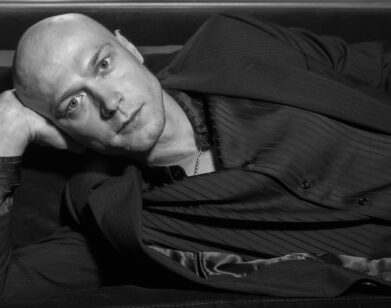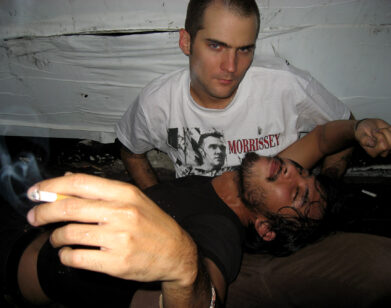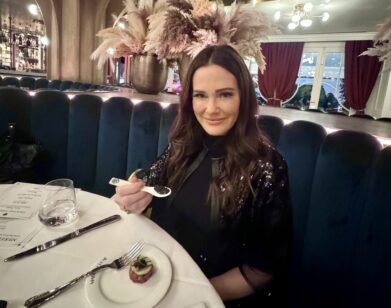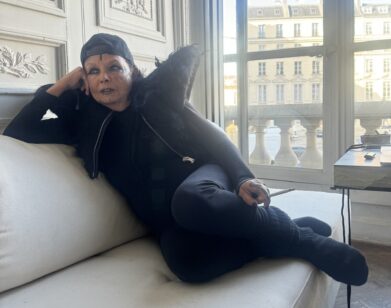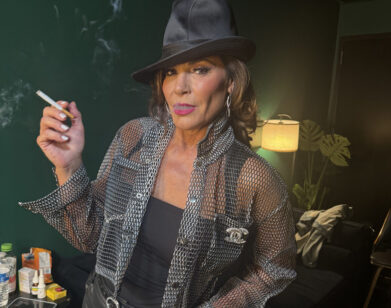Darcey Steinke and American Womanhood
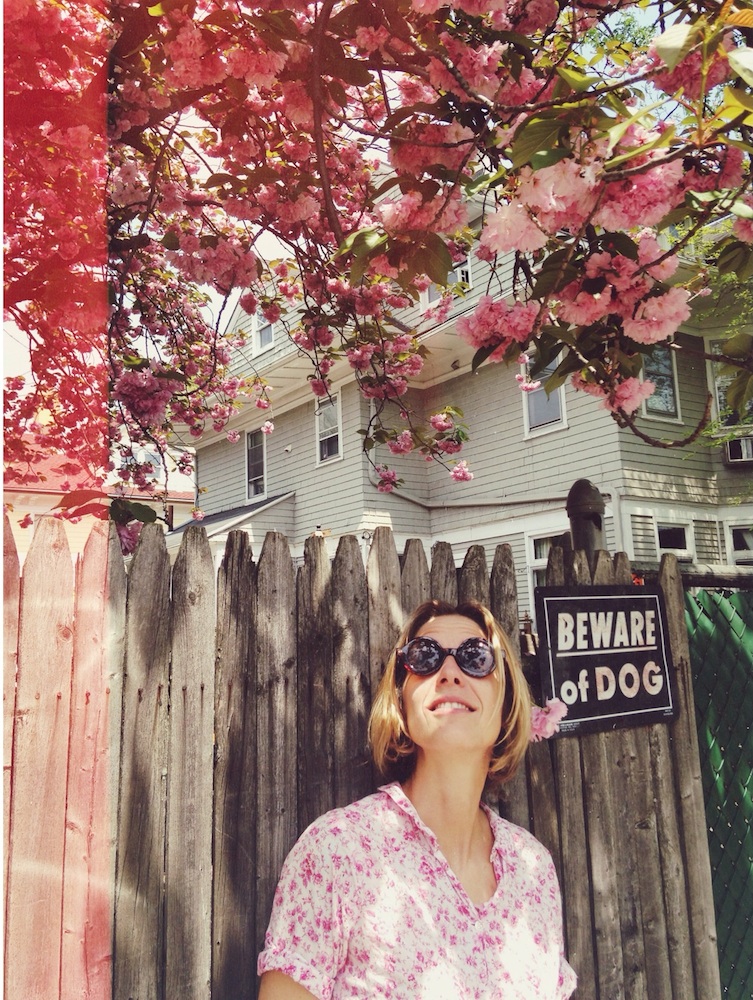
ABOVE: DARCEY STEINKE. PHOTO COURTESY OF ABBIE HORNBURG.
It’s the summer of 1972: Jesse’s father is a former pastor, defrocked for growing his hair too long and having love-ins. Her mother is pathologically moody and obsessed with the Kennedy family. When the family moves south to Virginia, Jesse spends the final days of her girlhood smoking the tips of seedlings, dressing up with the most beautiful girl next door as a Playboy bunny, and making out with the former school bus bully.
In Sister Golden Hair (Tin House Books) we roam a 1970s landscape of macramé planters and candy dishes and polyester pants. Set in a community decaying from within, Darcey Steinke’s new novel examines what ingredients make an American girl.
We recently met Steinke at Café Loup in New York to discuss the falseness of celebrity, sexuality as a continuum, Hawthorn, and the myth of the knight in shining armor.
JENNIFER SKY: What came first with this, the title or the book?
DARCEY STEINKE: I couldn’t figure it out at first. About two years ago, I was going to my friend Barry Hannah’s funeral and I was driving from Memphis to Oxford and that song came on the radio, “Sister Golden Hair,” and I thought that would be a good title for my book. It just kind of came to me.
SKY: The song is by the band America, which seems fitting. Not only is the book about a girl coming into her identity and growing up, but it’s also about what it is to be a girl in America—that archetype of a blonde in America. In the book, you start with this question of faith—Jesse’s father is a former minister—and end with a question of faith. The first lyrics in “Sister Golden Hair” are, “Well I tried to make it Sunday.” I think you happened upon the perfect thing.
STEINKE: I sort of like that first line, it reminds me of the first line of a Jean Rhys story. “I tried to make it Sunday but I got so damn depressed, so I set my sights on Monday and I got myself undressed.” It could almost be the beginning of a first person story, there’s something so literary about it. I really like it.
SKY: It’s also about disappointment, right? About how this guy wasn’t ready for marriage.
STEINKE: I think that’s what the song is about—not [being] ready for commitment—but in my little girl mind when I liked it and I think of it now, I identify with him more than I identify with the woman that he doesn’t want to marry. I identify with wanting to have relationships that are more based on actual desire than convention. That’s why I thought the song would fit, because of the way that people project onto women and blondes, but also the idea that the conventional is not as nourishing or interesting as a relationship that could actually hold your real desires.
SKY: Something big in this book is Jesse questioning her sexuality, and the thread of sexuality. She’s attracted to girls. She’s attracted to boys. She’s questioning. Like you pointed out with the song, I think that something really important in this book is a question of human identity: that we have to choose a category instead of simply allowing ourselves to love. That’s something we program into everybody.
STEINKE: I think that’s right. There’s not really a continuum, but there should be. I was interested in writing about this because I think that I was so drawn to women before I started dating boys, but it wasn’t really sexual, I was fascinated by them and by what I would become soon. I think that’s something that I haven’t seen written about a lot. Not the character that’s drawn to women because she’s going to be a lesbian, but the character who is drawn to women because women are amazing—not necessarily in a sexual way, but the person you are going to turn into, the way your body is going to change. I was always fascinated with the girls just ahead of me; I think I’m fascinated by the girls just ahead of me now, too—50-year-old or 60-year-old women. When I was growing up, the girls that had already transitioned into having a woman’s body really fascinated me way more than any man or boy would at that point. Women were way more compelling to me.
SKY: Julie is a toxic character in the book. She’s a terrible alcoholic because she didn’t make it as an actress and terrible for the community. Then there’s also the Glenn McCabe character, a con artist who then takes advantage of everybody in the town and they just buy into it, they love it.
STEINKE: Because they’re so bored. They’re so bored they’re willing to believe this is going to happen even though it’s so far-fetched and crazy. There are so many traps for girls and to me, this was just another. The book is a lot about that, all the hoops girls have to jump through, and the idea of glamour and the promise of glamour is such a huge trap—for men too maybe, [but] definitely for young girls. It’s mind-numbing and it doesn’t lead them to the self-development that’s really necessary. It resides in the idea that you’re going to be discovered in the drugstore at the counter, and you’re going to be swept up in this life. But it doesn’t really lead you to do the hard work of becoming your own person. To me, that was important to put that in there. Even if you don’t have a Glenn McCabe come to your town, I think it’s like the princess and the prince myth. It’s very easy to be susceptible to the idea of someone saving you and pulling you into another life rather than you yourself doing the things you need to do. You don’t have to make yourself vulnerable to make it happen. [But] there can be so little self in those situations; you have to be what other people want. I see teenagers sometimes, they don’t want to try because they don’t want to fail, but to just be discovered, there’s nothing at stake really. It’s a narrative that, because of something about you—the way you look and who you are—you’re lifted up to this greater life. It’s a super addictive and mesmerizing idea for women, and it’s super dangerous. There’s no agency. Men have no trouble being like, “I’m going to do this,” “I’m going to do that,” but for women, it’s very different. You feel like you have to be chosen somehow.
SKY: I was interested in Sheila and Jesse relationship: Why do you think Jessie allowed Sheila to abuse her?
STEINKE: Lock her in the closet.
SKY: Yes, lock her in the closet. I know for me, there’s part that enjoys being the submissive. Is that what is was?
STEINKE: Yes. I definitely based that not on a specific thing, but on different ways that girls had been cruel to me and that I had put up with it. There is a blank spot where you don’t even think, “I don’t deserve this.” Maybe at 21 it would be different, but at 15, you’re sort of like, “Okay, this girl I really admire has locked me in the closet.” It wouldn’t occurred to you to say, “Fuck you, you’re not going to be my friend anymore.”
SKY: In the book, Sheila was being abusive because, it seemed to me, she was being abused by her teacher. She was acting out.
STEINKE: Yes, also by her mother and her stepfather. She’s upset about her father being gay. In my mind, that was how I used it. That’s kind of true, when teens are means to other teens,
SKY: It’s coming from somewhere.
STEINKE: I really enjoyed writing that part. I myself was obsessed with Playboy bunnies and all different kind of weird, out-there sexual things that weren’t really sexy, but they seemed sexy. I had not ever written anything like that before.
SKY: “The Birth-Mark” is a short story written by Nathaniel Hawthorn that examines human perfection. Your character Pam has a large birthmark on her face and is socially ostracized for it. Were you inspired by that story?
STEINKE: That story means a lot to me. That story reminds me of the way that, in our culture, people that are different are a real flash point in what we think about ourselves, what we think about God. The idea, “Does God exist if they made this person?” Or, “Does everyone need to look like us to be us?” It’s not about that at all. It so much more about who we are and what it is to be human. I love that story. The Pam story in my book is not exactly true, but there were kids that had different challenges when I was in junior high and high school. I wanted to write about one of them that decided to take the brave route rather than pretending like everyone else—like the traps for girls to be beautiful. Pam did wear makeup, but she also was like, “This is the reality: the human reality is not perfection, the human reality is that not everyone looks fantastic.” I wanted to have a scene like that of the female, the physical being, that wasn’t all about being a Playboy bunny and being pretty, but that was about the realness of it. I wanted it to be a moving scene in the book. It’s a scene where someone is actually showing their true self.
SISTER GOLDEN HAIR IS OUT NOW FROM TIN HOUSE BOOKS.

